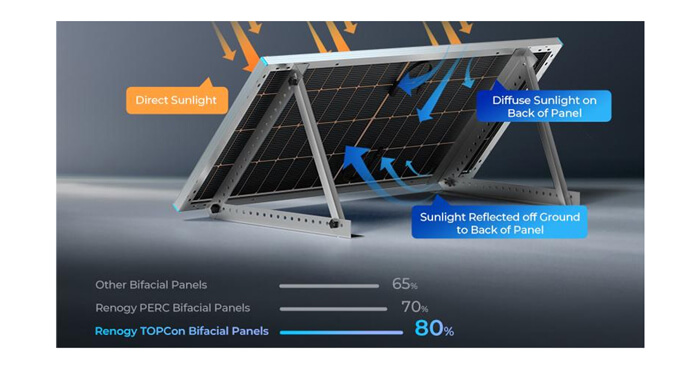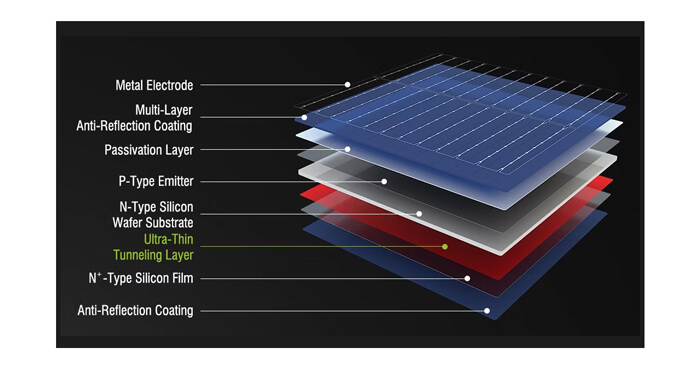Contents:
Overview of N-Type Solar Panels
N-type solar panels represent a significant advancement in photovoltaic technology, offering high efficiency, better performance under low-light conditions, and longer lifespans. These panels utilize silicon wafers doped with phosphorus, making them resistant to light-induced degradation (LID) and increasing their energy yield over time.

Key Features of N-Type Solar Panels
| Feature |
Description |
| Higher Efficiency |
Converts more sunlight into electricity, reaching 20-25%. |
| LID Resistance |
Minimal performance drop after exposure to sunlight. |
| Durability |
Longer operational lifespan, typically over 30 years. |
| Temperature Tolerance |
Performs better in high-temperature environments. |
| Bifacial Options |
Generates power from both front and rear sides of the panel. |
Adoption of N-Type Solar Panels in Pakistan
As Pakistan faces rising energy demands and frequent power shortages, solar energy has become an attractive alternative. N-type solar panels, though relatively new to the market, are gaining traction due to their efficiency and suitability for the country’s climate.
-
Urban Deployment: Residential rooftops in major cities like Karachi, Lahore, and Islamabad benefit from their high efficiency and compact size.
-
Rural Applications: Off-grid villages use N-type panels for reliable electricity in remote areas.
-
Commercial Projects: Large-scale solar farms and industrial setups are adopting N-type technology for sustainable power solutions.
Cost Considerations
|
Factor
|
Price Impact
|
|
Initial Investment
|
Higher than traditional panels but justified by efficiency.
|
|
Energy Savings
|
Lower operational costs and faster payback periods.
|
|
Maintenance
|
Requires less maintenance due to superior durability.
|
Market Growth Drivers
-
Government Policies: Incentives such as tax rebates and net metering encourage solar panel adoption.
-
Decreasing Prices: Technological advancements are gradually lowering production costs.
-
Environmental Benefits: Increased awareness of clean energy boosts demand for eco-friendly technologies.
Challenges and Opportunities
|
Challenge
|
Opportunity
|
|
High Initial Costs
|
Educating consumers on long-term savings is essential.
|
|
Lack of Local Manufacturing
|
Potential for domestic production to reduce costs.
|
|
Technical Expertise
|
Growing need for skilled workforce in solar technologies.
|
Top Suppliers in Pakistan
-
International Brands: JinkoSolar, LONGi, and Trina Solar offer advanced N-type solutions.
-
Local Distributors: Companies like Tesla Solar and Premier Energy ensure availability and support.
Advantages of N-Type Solar Panels in Pakistan's Climate
Pakistan's diverse climate, ranging from arid deserts to humid coastal regions, makes solar panel durability and performance critical. N-type panels excel in these conditions:
-
High-Temperature Resilience: The high-temperature coefficient of N-type panels ensures efficient performance in regions with extreme heat, such as Sindh and southern Punjab.
-
Low-Light Performance: Even in the winter months or during cloudy weather in northern areas like Gilgit-Baltistan, these panels maintain strong energy production.
-
Dust and Dirt Resistance: With advanced coatings, N-type panels are less prone to dirt accumulation, which is a common issue in dusty environments.
Application Sectors in Pakistan
|
Sector
|
Use Case
|
Impact
|
|
Agriculture
|
Solar-powered water pumps for irrigation.
|
Reduces reliance on diesel generators.
|
|
Healthcare
|
Off-grid energy for rural clinics and hospitals.
|
Ensures uninterrupted power for critical equipment.
|
|
Education
|
Power for schools in remote areas.
|
Enables modern teaching tools and facilities.
|
|
Small Businesses
|
Energy independence for SMEs and shops.
|
Reduces operational costs and dependency on the grid.
|
Technological Innovations
The solar industry is witnessing continuous innovation in N-type technologies, further improving their adoption potential in Pakistan:
-
Bifacial Panels: N-type bifacial panels are ideal for installations where reflected sunlight (albedo) can be captured, increasing energy output.
-
PERC and TOPCon Technologies: These advancements in cell structure enhance performance and efficiency, making N-type panels even more attractive.
-
Hybrid Solar Systems: Combining N-type panels with energy storage solutions ensures reliable power during load shedding and nighttime use.

Key Considerations for Buyers in Pakistan
|
Consideration
|
Recommendation
|
|
Energy Needs
|
Assess daily electricity requirements before purchasing.
|
|
Quality Certifications
|
Look for IEC and TUV certifications for reliability.
|
|
Installer Expertise
|
Choose experienced installers to ensure proper setup.
|
|
Warranty and Support
|
Opt for panels with long warranties and after-sales service.
|
Role of Government and Policy Support
The Pakistani government plays a vital role in promoting renewable energy solutions. Policies such as net metering allow households and businesses to sell surplus solar energy back to the grid, making investments in solar panels more appealing. Additionally, the Alternative Energy Development Board (AEDB) is actively working on programs to boost the adoption of advanced solar technologies like N-type panels.
Government subsidies and tax exemptions for solar installations further reduce the financial burden for consumers, encouraging a wider transition to clean energy. Collaborations with international organizations also pave the way for technical expertise and financial aid, which can drive the adoption of high-efficiency solar panels.
Environmental Impact of N-Type Panels
Switching to N-type solar panels significantly reduces carbon emissions and dependence on fossil fuels. Their higher efficiency and long lifespan translate to more sustainable energy production over time. For a country like Pakistan, where urban pollution and rural deforestation are pressing issues, renewable energy solutions offer a dual benefit: mitigating environmental degradation while ensuring energy security.
The adoption of solar panels also helps conserve water resources by reducing the need for water-intensive thermal power generation. This is particularly valuable in water-stressed regions of Pakistan, where preserving natural resources is critical.
Economic Benefits
Investing in N-type solar panels offers long-term economic advantages, particularly for commercial and industrial sectors. Businesses experience reduced electricity bills, improved energy independence, and stable operations during power outages. Solar farms powered by N-type panels create job opportunities in installation, maintenance, and system integration, fostering growth in the renewable energy sector.
Moreover, widespread adoption of N-type panels positions Pakistan as a regional leader in sustainable energy, attracting foreign investment and strengthening the economy through clean energy exports.
Recommendations for Accelerating Adoption
-
Public Awareness Campaigns: Educate consumers about the benefits of N-type solar panels to address misconceptions about upfront costs and installation complexity.
-
Incentivize Local Manufacturing: Encouraging domestic production of N-type panels can reduce costs and create jobs, enhancing accessibility for the local market.
-
Skill Development Programs: Training technicians and engineers in advanced solar technologies ensures proper installation and system maintenance, boosting consumer confidence.
-
Focus on Rural Electrification: Expanding off-grid solar solutions in remote areas can transform lives by providing access to electricity for homes, schools, and businesses.
With a strategic focus on sustainability, innovation, and collaboration, N-type solar panels can transform Pakistan's energy landscape, offering a cleaner, more reliable, and efficient solution to its growing power demands.
FAQs on N-Type Solar Panels in Pakistan







